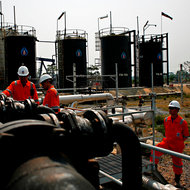The cause was congestive heart failure, said his son Richard, president and chief executive of the company.
Daniel Edelman started the company, Edelman, in a small office in Chicago in 1952. It now has 63 offices in 26 countries with more than 4,600 employees and revenue of $660 million last year.
Steve Barrett, editor of the trade publication PRWeek, called Edelman “easily the biggest agency in the world.”
Over the years, Mr. Edelman helped build leading brands like Sara Lee and KFC. The firm’s current clients include Microsoft, Pfizer, General Electric, Wal-Mart Stores, Abbott Laboratories, Samsung, Royal Dutch Shell, Kraft, Johnson Johnson and Unilever.
In the 1950s, Mr. Edelman arranged for Businessweek and Life magazines to publish articles about the manufacturing and distribution processes at Sara Lee, the baked goods company.
When the California wine industry turned to him in 1966 to promote its products nationwide, Mr. Edelman hired Vincent Price as a spokesman and had him appear on “The Tonight Show.”
Beyond promoting his clients, Mr. Edelman had a significant influence on the methodology of public relations.
“When I teach the modules on the history of public relations, I tell my students that Mr. Edelman was one of our pioneers,” said Maria P. Russell, chairwoman of the public relations department at Syracuse University’s S. I. Newhouse School of Public Communications. “Specifically, he helped public relations professionals move away from being order-takers to respected counselors to business executives and government leaders.”
As an example, Richard Edelman cited his father’s work in the firm’s representation of the Mormon Church for a decade, starting in the mid-1990s. The idea of the publicity campaign, he said, “was that this religion has made a very important contribution to America and had changed from some of its original precepts.”
Daniel Joseph Edelman was born in Manhattan on July 3, 1920, one of five children of Selig and Selma Edelman. His father was a lawyer and his mother was a concert pianist. He graduated from DeWitt Clinton High School in the Bronx and from Columbia University in 1940, then earned a master’s degree in journalism there.
After a stint as a sports reporter at a newspaper in Poughkeepsie, N.Y., he served in an Army psychological warfare unit in World War II, broadcasting in Europe. After the war, he was a night news reporter for CBS in New York, but he soon took a job as a publicist for Musicraft Records, helping to promote jazz stars like Duke Ellington, Sarah Vaughan and Artie Shaw.
By 1947, Mr. Edelman had moved to Chicago to become public relations director for Toni, a home hair care company. The company had an ad campaign featuring identical twins, one with a beauty salon permanent, the other with curls from a Toni do-it-yourself kit. Women were challenged to determine “which twin had the Toni.”
Mr. Edelman’s idea was to send six sets of twins on a media tour to 72 cities. After four years at Toni, he started his own public relations company, with Toni as his first client.
Besides his son Richard, he is survived by his wife of 59 years, the former Ruth Ann Rozumoff; another son, John; a daughter, Renee; and three granddaughters.
Article source: http://www.nytimes.com/2013/01/16/business/daniel-j-edelman-a-publicity-pioneer-dies-at-92.html?partner=rss&emc=rss
